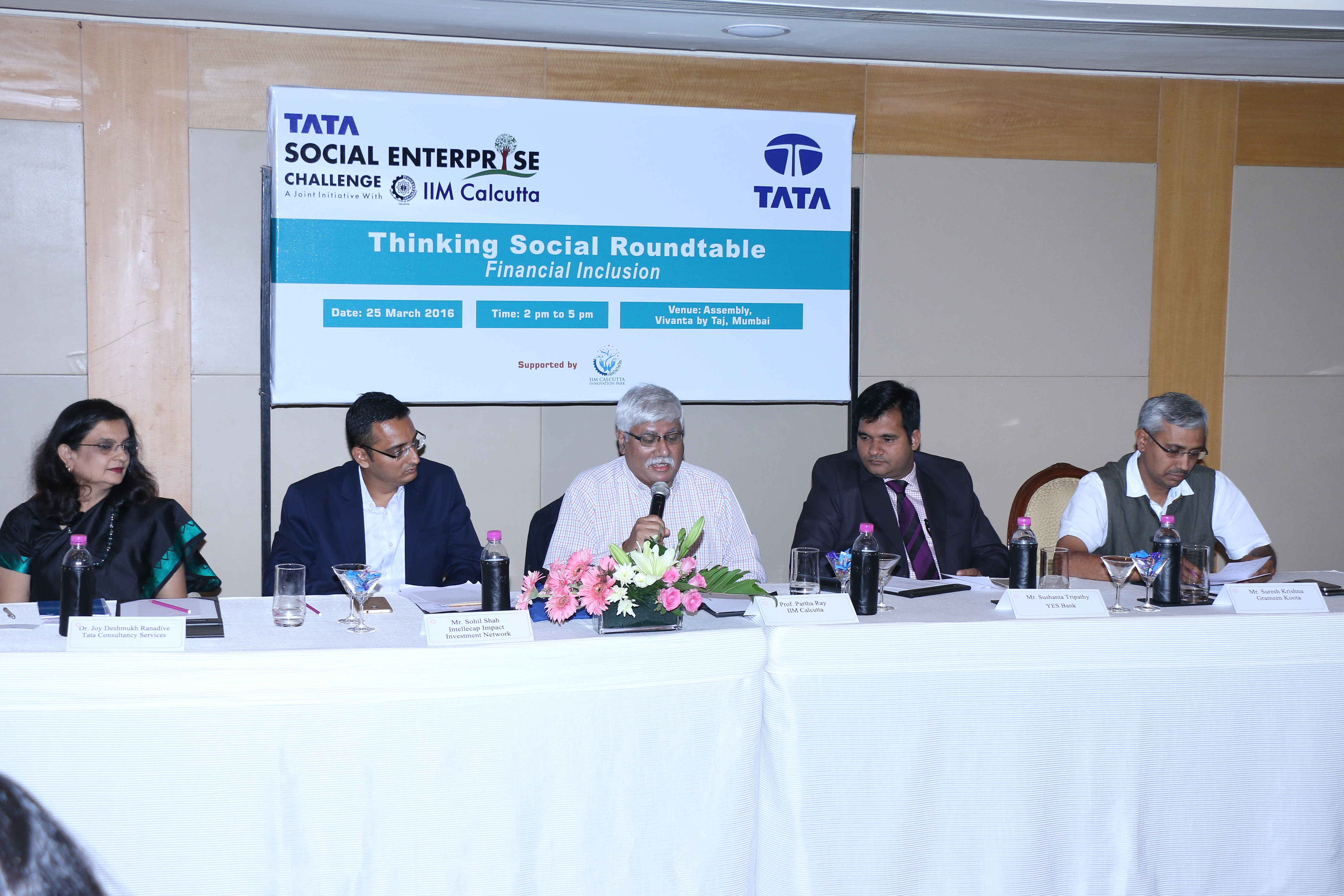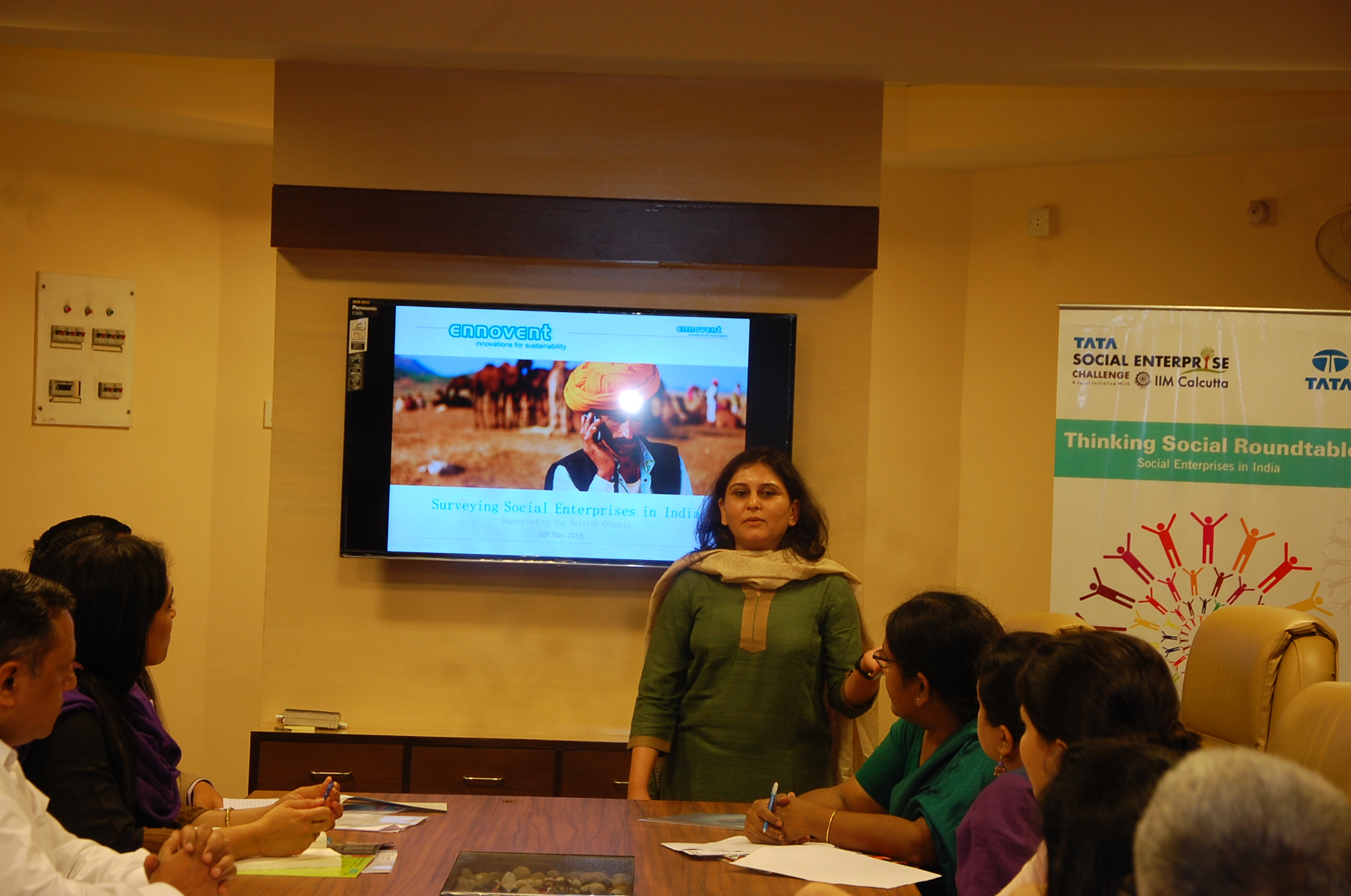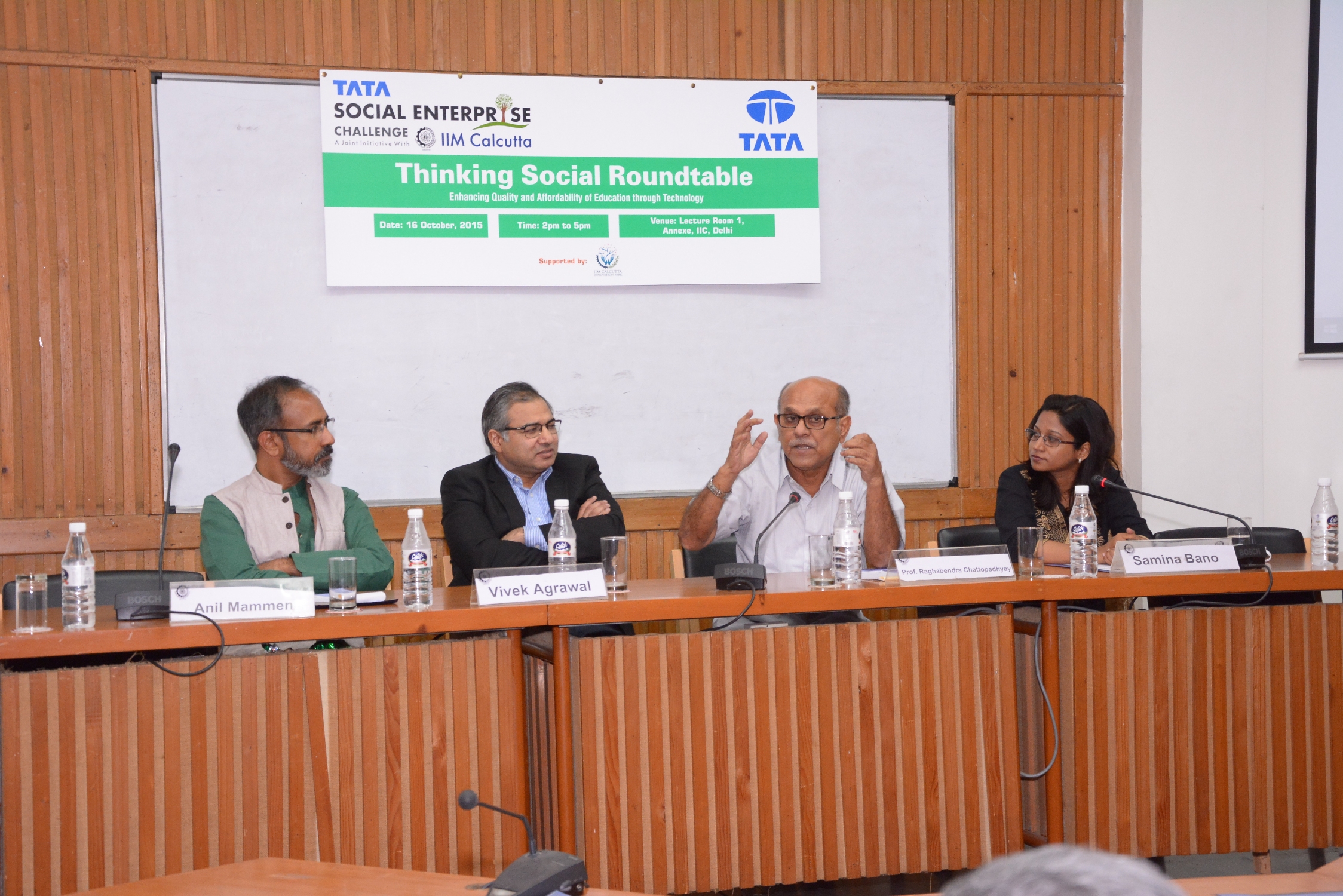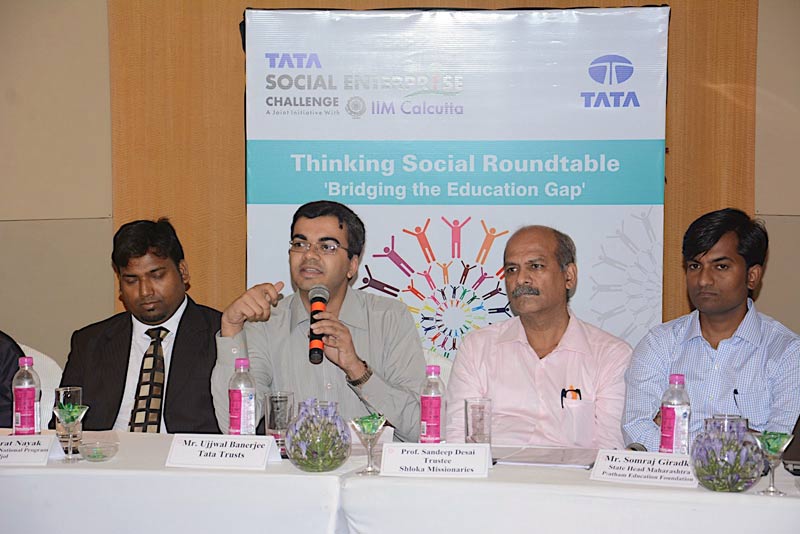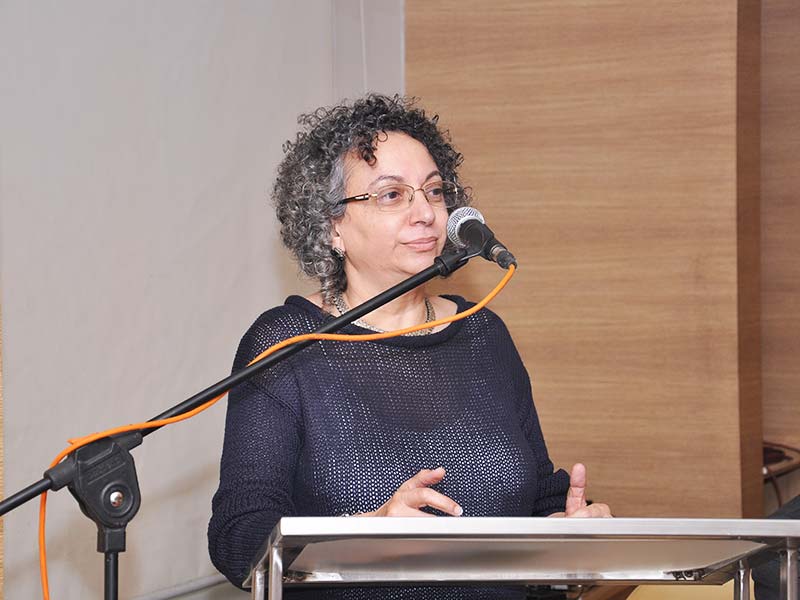Roundtables
Thinking Social Roundtable on Affordable and Clean Energy
IIM Calcutta Innovation Park in association with the TATA group hosted the annual event of the ‘Thinking Social Seminar’ roundtable session on the theme “Clean and Affordable energy” at Kolkata on January 12, 2017. The primary objective of this event was to showcase how the global access to modern and renewable energy and clean fuel is fundamental to meeting several challenges the world is currently facing, including poverty, food security, climate change, clean water, health and inclusive economic growth. The speakers of the seminar comprised of eminent power utility companies like Tata Power, Tata Cleantech Capital Limited and distinguished personalities from renewable energy sector who are well established and have impacted the lives of thousands of people.
Professor Balram Avittathur, Professor Operations Management, from IIM Calcutta, in his inaugural address spoke about why the renewable technologies are considered as clean sources of energy and how the optimal use of these resources could minimize environmental impacts, produce minimum secondary wastes and also are sustainable based on current and future economic and social societal needs.
Mr. Arunavo Mukherjee, Vice President – Advisory Services, Tata Cleantech Capital Limited shared his experience in energy industry spanning coal, natural gas and renewable sources. Mr. Mukherjee shared his experience with the Tata group since 1991 how he was instrumental in leading the Tata group effort to combat climate change across its 100 companies. Mr Mukherjee also explained how Tata Capital and International Finance Corporation have come together to form Tata Cleantech Capital Limited (TCCL) with the aim of providing the right advice and funding effective solutions. TCCL now address one of the key issues in building a sustainable framework and has now the ability to bear long-term and capital-intensive expenditure.
Dr. S.P.Gon Chowdhury, Former Director. West Bengal Renewable Energy Development Agency, spoke about how the off-grid PV system with mini-grid concept has received renowned recognition and is now the most viable technology options for off grid energy and is also the most promising and emerging technologies to scale up in the future. He also explained how the renewable energy power generation is still relatively expensive in spite of its various advantages. So in order to make renewable energy cost effective demand side management is very important. Dr. Gon Chowdhury was also very optimistic that if the Indian government adopts this policy process, it will greatly help in making off-grid energy mainstream, which is currently not the case. Adoption of such a policy initiative would also help scale-up the off-grid market.
Mr. Vinay Jaju, COO, Onergy Solar, (a renewable energy venture), is aimed at providing complete energy solutions to eastern India, with special focus in the rural areas, which are energy deficient & economically backward. The target of Onergy solar is to create a sustainable and equitable India by providing access to clean energy by energizing rural India by promoting lighting, cooking, cold storage, solar irrigation and electrification solutions. Onergy also services corporates & institutions through its product offerings & system integration services.
Mr. Mithun Chakraborty, Assistant General Manager, Tata Power Delhi Distribution Limited (TPDDL) highlighted the ambitious Govt. target on Renewable Energy especially Solar and the challenges that Discoms are going to face in integrating large amount of distributed solar into the grid. Also, the issue of existing Power Purchase agreements which need to be handled and the effect on cross subsidies as large industrial and commercial consumers move towards solar rooftops. Further, the alternatives such as demand response and battery storage on which discoms have to work on to mitigate the challenges of infirm renewable generation.
The discussions were followed by an interactive question and answer session where the experts addressed the queries raised by the audiences on how the solar industry has given the solar companies a unique platform to distinguish themselves from the competition and have also proved how innovative they really are. The range of innovations encompasses the entire value-added chain of innovative battery and energy storage technologies – from components to production to concrete applications and business models, the government’s policies and interventions on solar policy and reforms etc.
In the next session, Prof. Asok Banerjee, Director, IIM Calcutta Innovation Park shared the journey of “Thinking Social” – one of the flagship event of IIM Calcutta conducted in partnership with the TATA group. Prof. Banerjee accentuated the primary objective of the event which was to build awareness on social entrepreneurship, generate interest and inspire the young generation to come up with innovative solutions to address social challenges. As part of this initiative, IIMCIP conducts several seminars, roundtables and lecture series across India, which culminates into our flagship business plan contest called – The Tata Social Enterprise Challenge. In the current year i.e. the 5th edition of the TSEC business plan contest over 200+ impact proposals of social ventures from all across the world. The snapshots of the top 20 participants of this year’s TSEC event were also presented to the audience.
The roundtable concluded with a vote of thanks followed by a press meet where the IIM Calcutta Innovation Park team comprising of Prof. Asok Banerjee, Director IIM Calcutta Innovation Park, Mr. Subhrangshu Sanyal, CEO IIM Calcutta Innovation Park, Prof. C. D. Mitra, Advisor, IIM Calcutta Innovation Park, who highlighted the role of IIM Calcutta Innovation Park in social entrepreneurship space and how the ‘INVENT’ program would be addressing the challenges and barriers across the inclusive innovation lifecycle, for the benefit of up to 1m poor people at the bottom of the economic pyramiding the low income states of India and in low income countries.
Read MoreThinking Social Roundtable (Delhi) – 9 September 2016
The second “Thinking Social” roundtable for the year 2016-17 was organized under the aegis of Tata Social Enterprise Challenge (TSEC), by IIM Calcutta Innovation Park (IIMCIP) in association with the Tata group in Delhi. The theme of the roundtable was “Sustainable Community through Women Empowerment”.
The speakers for the day comprised of eminent entrepreneurs, investors, domain experts and policy makers who have rich experience in the development sector in India. The audience (a strong presence of 36 participants) comprised of industry leaders, academia, entrepreneurs and investors focused on women empowerment.
In the inaugural session, Dr. Subhrangshu Sanyal, CEO – IIM Calcutta Innovation Park introduced the theme and shared with the audience the objective of this roundtable under the umbrella of the Tata Social Enterprise Challenge 2016-17.
The panel discussion was moderated by Prof. Bhaskar Chakrabarti of IIM Calcutta. He gathered valuable insights from the roundtable on how more stress should be given on skill development for women and continuous assessment of various training programs needs to be done. He also threw light on how obstacles in the social system need to be done away with for the betterment of women.
Ujjwal Banerjee, Manager – Education, Tata Trusts, spoke about how women need to engage not only with literacy but they also need to deal with social forces that hinder them. He said that women in the villages are now aware of government schemes and programs, which can be used to their advantage. Tata Trusts, he said, has a three year program for women and works with children which is another aspect of their program.
Meenu Vadera, Founder, Sakha Consulting Wings Private Limited, said that empowerment of the women community should be taken up strongly as it is a root to the GDP growth of the country. In India, classification on the basis of caste still plays a dominant role and women are the worst sufferers of it. There are many social constraints which are preventing women from acquiring the skills to better themselves, and there must be long term programs in skilling women. If a woman gets employed, there is a significant change in the mindset of her children also, especially if she has a girl child.
Ravindra Joshi, Additional General Manager (Special Consumer Group), Tata Power, spoke about women being employed on behalf of Tata Power in the slums. He highlighted the fact that electricity losses in Delhi slum areas was 68% and with their intervention, it has come down to 18%. Also, payment collection efficiency has increased from 60% to 98.9%. He said that they are currently working on a “Winning the heart model” which is working on providing self-esteem to people. Women literacy centres are being formed in the slums and 40,000 ladies have been trained so far, and vocational training has been imparted to more than 12,000 people.
Gauri Singh, Founder & Director, The Maids’ Company, shared that almost 50% of the population in India is women, but unfortunately there are not too many opportunities for them to grow. Their target is the domestic workers at the bottom of the pyramid. Since there is no barrier for entry, women prefer this work. However, due to their obligations towards their family, it is difficult for them to do a 9 – 5 job. Hence, skilling these women is an issue as they don’t have the time. The market demand in this job has also changed as households expect that the maids would make pastas and soups for them and operate washing machines, dryers, iron, etc., and fulfilling such demands need special skills. She further added that social entrepreneurs need to keep in mind the scale of operations too.
The Q&A round witnessed good participation from the audience. There were many significant issues discussed and addressed by the audience and the panelists.
The roundtable ended with a valedictory address and vote of thanks from IIMCIP.
Read MoreThinking Social Roundtable – Bangalore
The first “Thinking Social” roundtable for the year 2016-17 was organized under the aegis of Tata Social Enterprise Challenge (TSEC), by IIM Calcutta Innovation Park (IIMCIP) in association with the Tata group. The theme of the roundtable was “Providing Affordable Healthcare”.
The speakers for the day comprised of eminent entrepreneurs, investors, domain experts and policy makers who have rich experience in the Healthcare sector in India. The audience (a strong presence of 25 participants) comprised of industry leaders, academia, entrepreneurs and investors focused on the healthcare domain.
In the inaugural session, Dr. Subhrangshu Sanyal, CEO – IIM Calcutta Innovation Park introduced the theme and shared with the audience the objective of this roundtable and formally announced the launch of the Tata Social Enterprise Challenge 2016-17.
The panel discussion was moderated by Prof. Manish K Thakur of IIM Calcutta. He shared with the audience some facts and figures of the Indian Healthcare sector. Prof. Thakur stressed that at least 4% of India’s GDP is required to be spent on Healthcare but the fact is that only 1.5% of the GDP is being currently spent, which is lower than that of Thailand. He also spoke about the fact that not more than 24 million Indians are covered with health insurance policy. Prof Thakur then requested the panelists to share their insights on the challenges and opportunities that exist in this domain.
Dr. Sumanth Raman, Head-Healthcare Innovation, Tata Consultancy Services Ltd, spoke about the hard challenges faced by the Healthcare sector in India and stressed that India should be at par with at least Sri Lanka and Bangladesh in terms of Healthcare spend. Dr Raman mentioned, “The healthcare costs are going up day by day which is pushing India’s rural population to poverty and there is a tremendous shortage of healthcare facilities in the rural areas. The problem lies in the distribution of healthcare personnel as no one wants to go in these areas.” He insisted that a strong public health system is needed like that in the UK and that the PPP model should be encouraged. The key areas where improvement is required is to measure the quality of healthcare indices and unconventional methods like technology, electronic medical records etc.
Meena Ganesh, Co-founder and CEO – Portea Medical, said that there needs to be a continual care of patients post hospitalization – which is lacking to a great extent in India – and which is resulting in enhanced re-admission rates. She mentioned that, “70% needs of the patient can be delivered outside the hospital by proper healthcare management at home.” Meena concluded by saying that the performance of hospitals and management of patients’ health needs to be measured.
Vikram Vuppala, Founder and CEO – NaphroPlus, spoke about chronic disease management in the healthcare sector which needs to be improved in our country. He stressed the importance of the PPP model which is required to improve the Indian Healthcare sector. Vikram mentioned that, “It is okay for the private players to make 15% profit margin in order to make their business scalable and reach to the masses.” He concluded by saying that there needs to be a rationalization of salaries in various levels of healthcare workers.
Rajiv Vasudevan, CEO – AyurVaid Hospitals, spoke that chronic illnesses require a comprehensive, customized and affordable approach to prevention and cure and that Ayurveda is innovatively meeting the demand. He stressed on the fact that there needs to be proper care that would enable a person’s health and sustained wellbeing, by empowering the community of patients and their families, doctors, and caregivers.
The Q&A round witnessed good participation from the audience. There were many significant issues discussed and addressed by the audience and the panelists.
The roundtable ended with a valedictory address and vote of thanks from IIMCIP.
Read MoreThinking Social Roundtable – 25 March 2016 (Mumbai)
The fourth “Thinking Social” roundtable was organised under the aegis of Tata Social Enterprise Challenge 2015-16, by IIM Calcutta Innovation Park (IIMCIP) in association with the Tata group on the theme of “Financial Inclusion”. The object of this roundtable was to bring together key stakeholders in the financial services domain on a common platform and exchange ideas, highlight key issues and challenges, identify opportunities and draw out best practices.
The speakers for the day comprised venture capitalists, investors and domain experts who have rich experience in the Financial Services domain in India. The audience comprised of industry leaders, academia, entrepreneurs, consultancies and investors focused on the financial services sector.
The panel discussion was moderated by Prof. Partha Ray of IIM Calcutta. He set the context by illustrating the status of Financial Inclusion and highlighting the global initiatives that have been taken in this domain. He stated that only about 60% adults in the world have bank accounts. Prof. Ray concluded, “Financially inclusive countries tend to have a much higher growth rate.”
Prof. Ray requested the panelists to share their insights on the challenges and opportunities that exist in this domain.
Dr Joy Deshmukh-Ranadive, Global Head, Corporate Social Responsibility, Tata Consultancy Services, spoke about the problems of reaching the unbanked people in society. She explained that there are four distances in reaching the unbanked – Regional distances, Economic distances, Marginalization distances and Socio-psychological distances. She advised, “Social entrepreneurs need to examine not only the demand side but also the supply side in this domain.”
Suresh Krishna, Director, Grameen Koota pointed out that in India’s case, more than 60% of the total population has no access to banking facilities. From Grameen Koota’s experience he said, “Micro finance in the last two decades has taught us that the poor are more bankable and they maintain 100% on-time repayments.” He commented, “Financial Inclusion is very important for a peaceful society, so that everyone is gainfully and meaningfully included in it.”
Sohil Shah, Manager at Intellecap Impact Investment Network spoke about the role of technology and the current frenzy of the fintech start-ups. He said, “The financial services sector in India is in its early stage of disruptions. Consumer behavior is changing rapidly and that is where the fintech start-ups are going to play a crucial role in enabling financial inclusion.” He advised, “We need a holistic focus on increasing the financial literacy of all stakeholders, only then will we be able to increase the coverage and adoption of technology in this space.”
Sushanta Tripathy, Executive Vice President at Yes Bank spoke about how the RBI and the government of India has a strong focus on the Financial Inclusion domain and the activities they have undertaken to improve effectiveness in this domain. He updated the audience that, “In 2016, the banks need to prepare a district-wise financial plan for the next 3 years covering 637 districts on 77 defined parameters.”
In the Q&A round many significant issues were discussed and addressed by the audience and the panelists.
Read MoreThinking Social Roundtable – Chennai
The third “Thinking Social” roundtable was organised under the aegis of Tata Social Enterprise Challenge (TSEC) 2015-16, by IIM Calcutta Innovation Park (IIMCIP) in association with the Tata group. The theme of the Roundtable was on “Healthcare” and this event was supported by Coaching Foundation India Limited (CFI). This thematic Roundtable included two interactive panel discussions – one focusing on Quality, Access and Affordability and the other focusing on Leadership in the Healthcare domain.
The speakers for the day comprised eminent entrepreneurs, investors, domain experts and policy makers who have rich experience in the Healthcare sector in India. The audience (a strong presence of 50 participants) comprised of industry leaders, academia, entrepreneurs and investors focused on the healthcare domain.
In the inaugural session, Mr Mali Mahilngam from the Chennai Chapter of IIM Calcutta Alumni introduced the theme and shared with the audience the objective of this roundtable.
The first panel discussion on the theme – Access, Affordability and Quality of Healthcare – was moderated by Mr Sameer Mehta, Director at Dr. Mehta’s hospitals. Sameer set the context by illustrating the status of healthcare in our country and requested the panelists to share their insights on the challenges and opportunities that exist in this domain.
Dr P Umanath – Additional Secretary, Govt. of Tamil Nadu spoke about how Government is addressing the access issue in a phased way. The first phase was quantitative in approach while the second phase was on ensuring quality in the hospitals. He further said, “Tamil Nadu has the highest accessible networks in the entire country with 1050 Primary centers, 300 first level healthcare centers, 300 secondary level healthcare centers and 43 institutions in the state are attached to 20 medical colleges.”
Dr Sumanth Raman, Head-Healthcare Innovation, Tata Consultancy Services Ltd spoke about how technology and smart devices can help in improving quality, access and affordability of healthcare services. He said, “Healthcare delivery is radically changing and is a few years away from the tipping point where technology will start to significantly drive the healthcare delivery.” He also urged the Government to facilitate implementation and usage of technology enabled healthcare solutions like telemedicine and tele-radiology.
Mr Ponarul A.P., Startup Scout at Unitus Seed Fund, spoke from an investor’s point of view and discussed what they look for when they invest in healthcare startups. He mentioned that innovation not just in technology, but also from a business model perspective, is important from the funding perspective and gave examples of startups where the fund has invested. He concluded by saying, “We look for low cost diagnostics and monitoring solutions where we see how technology has been leveraged and how does it reaches the bottom of the pyramid in terms of access.”
Mr Arun Venkatesan, Senior Advisor at Villgro spoke about the user-centric design in the healthcare sector where one has to understand purchasing and dissemination patterns and work with what’s available. He said, “There is a great opportunity for startups and enterprises if you can tweak your delivery model and align it to the buying patterns and functioning patterns of the government.” He also spoke about the need to bridge the gap from the policy perspective and the service delivery perspective.
In the concluding session, the moderator requested the panelists to comment on the top priority (out of access, affordability and quality) in this domain and a majority identified Quality of healthcare as the critical success factor.
The second Panel Discussion was around the theme of leadership in the healthcare industry. Mr R Ramraj, Senior Advisor at Elevar Equity, moderated the Panel discussion and introduced the topic by commenting that managing healthcare enterprises is more complex than it appears and it demands specialized skills. He requested all the Panelists to share their experiences and insights on the theme. The panelists for this session were Dr Arjun Rajagopalan, Trustee & Medical Director at Sundaram Medical Foundation, Mr RD Thulasiraj, Director Operations at Aravind Eye Care, Madurai and Mr Nishith Mohanty, Global HR Head at Manipal Group, Bangalore. They shared case studies from their organizations and remarked that quality of leadership is a critical success factor for healthcare organizations.
The Q&A round witnessed good participation from the audience. There were many significant issues discussed and addressed by the audience and the panelists.
The roundtable ended with a valedictory address and vote of thanks from IIMCIP and CFI.
Read MoreThinking Social Roundtable – Kolkata
The second Roundtable of the “Thinking Social” series, organized by IIM Calcutta Innovation Park (IIMCIP) and Ennovent, was held on 30th November 2015 at the Indian Institute of Management, Kolkata under the aegis of Tata Social Enterprise Challenge (TSEC) 2015-16. The theme of the Roundtable was ‘”Social Enterprises in India”.
The British Council has commissioned a baseline study on the Social Enterprise Landscape in India, which is being conducted by Ennovent. The aim of the study is to provide a summary of the current size and scale of the social enterprise sector and give stakeholders a clear picture of the existing landscape and help them identify areas in which their support is most needed. The aim of the baseline study is to provide a summary of the current size and scale of the social enterprise sector in India. The survey will contribute to the improvement of the social enterprise ecosystem by obtaining currently unavailable numbers on various indicators, giving stakeholders a clear picture of the existing scenario and helping them identify areas in which their support is needed.
The objective of the roundtable was to disseminate the findings of the Landscape Survey of Social Enterprises in India captured through survey responses and interviews conducted so far, with a specific focus on East India. The audience mainly comprised of eminent social entrepreneurs, academicians and NGOs mainly from the Eastern part of the country.
The discussion was initiated by Juhi from Ennovent who shared with the audience the findings of the survey which they had conducted. The following points were discussed:
Distribution of Social Enterprises by State
The panel discussed that a lot of innovative business models exist at the ground level but they often go unnoticed because they do not have access to communication services like the internet. They also decided to do a search on the operational presence of SEs and conduct the survey in regional languages.
Distribution of Social Enterprises by Sector
The panel decided that methodology of framing sectors need more work as there are alot of activities which were not talked about. It was also pointed out that there should be a break up of skill development activities into non-farm livelihood and non-traditional livelihood.
Barriers to growth and Funding Challenges
Discussions took place regarding the lack of skilled manpower and training institutes is the biggest challenge for social enterprises. Also, there needs to be a more focussed sectorial analysis which needs to be carried out so that it gives us the dta about the most emerging areas in the SE space.
Feedback on the Study Report and Analysis
The survey should add an option of Lack of Training and Skill development institutes under the barriers to growth. It should also remove Micro Finance Institutes from the database. A proper definition about Social Enterprise must be formulated which would define the enterprise as a business which aims to be financially viable and creates an impact for the people at the BOP.
Read MoreThinking Social Roundtable – Delhi
The first event of the “Thinking Social” series of roundtables, organized by IIM Calcutta Innovation Park (IIMCIP), was held on 16th October 2015 at the India International Center, Delhi under the aegis of Tata Social Enterprise Challenge (TSEC) 2015-16. The theme of the Roundtable was ‘”Enhancing Quality and Affordability of Education through Technology”. The discussion was centered on three broad themes – Quality, Access, and Affordability of education for the masses. The overarching focus was the use of technology in meeting these three objectives.
The thematic Roundtable included an overview on Thinking Social, an interactive Panel discussion followed by Q&A and presentations from two social entrepreneurs working in the education domain.
The speakers for the day comprised eminent entrepreneurs and academician who have rich experience in the Education sector in India. The audience (a strong presence of 40 participants) comprised of Professionals, entrepreneurs, Impact investors, innovators, NGOs and students mainly from the Education sector.
In the inaugural session, Subhrangshu Sanyal – CEO, IIM Calcutta Innovation Park introduced the theme and shared with the audience IIMC’s journey on entrepreneurship, IIMCIP’s vision & activities and how TSEC emerged as one of the biggest platform for the social entrepreneurs in India.
Prof Raghabendra Chattopadhyay, IIM Calcutta moderated the Panel discussion and requested all the Panelists to share their thoughts on the challenges and opportunities around the theme.
Read MoreThinking Social Roundtable Mumbai
The third thematic roundtable of “TSEC Thinking Social Roundtable” series, organized by IIM Calcutta Innovation Park (IIMCIP), was held on 27th February 2015 in Mumbai, under the aegis of Tata Social Enterprise Challenge (TSEC).
The Mumbai Chapter of IIM Calcutta Alumni Association was instrumental in supporting the Roundtable. The theme of the Roundtable was ‘Bridging the Education Gap’. The main objective of this roundtable was to provide a platform, for the champions of education entrepreneurship ecosystem to exchange their experiences and ideas thereby perhaps create a set of best practices for the industry to emulate.
The thematic TSEC Roundtable was structured with an introductory address from IIP and the TATA Groups followed by Panel discussion with subsequent Q&A round and ending with a valedictory and thanking note from the IIMC Alumni Mumbai Chapter.
Read MoreThinking social Roundtable Bangalore
The maiden thematic roundtable of “TSEC Thinking Social Roundtable” series, organized by IIM Calcutta Innovation Park (IIMCIP), was held on 28th November 2014 in Bengaluru, under the aegis of Tata Social Enterprise Challenge (TSEC).
The Bengaluru Chapter of IIM Calcutta Alumni Association was instrumental in supporting the Roundtable. The theme of the Roundtable was ‘Providing Affordable Healthcare’. The main objective of this roundtable was to provide a platform, for the champions of healthcare entrepreneurship ecosystem to exchange their experiences and ideas thereby perhaps create a set of best practices for the industry to emulate.
The thematic TSEC Roundtable was structured with an introductory address from IIMCIP and the TATA Groups followed by Panel discussion with subsequent Q&A round and ending with a valedictory and thanking note from the IIMC Alumni Bengaluru Chapter.
Read More


